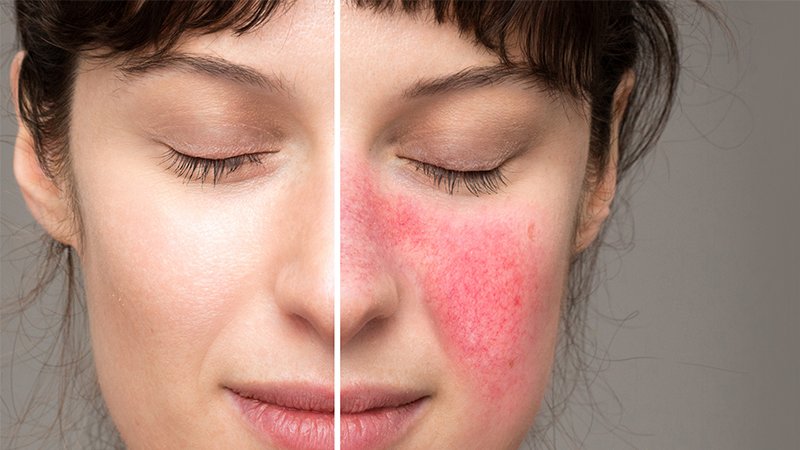Rosacea is a common long-term skin condition that primarily affects the sebaceous areas of the face. It is most common in women with lighter skin but can occur in men too – with men being more susceptible to more severe symptoms.
Symptoms of Rosacea
The first signs of rosacea are often episodes of ‘flushing’ but as the condition progresses symptoms can worsen and can include the following:
- Sensitivity, burning, stinging, itching, pain
- Permanent redness
- Dry, rough skin
- Spots (papules and pustules)
- Visible blood vessels
- Facial swelling
What causes Rosacea?
Rosacea is what is known as a relapsing condition which means sufferers can have periods where symptoms become much worse than at other times. It is not really known what causes it, but the NHS states that common triggers are:
- Alcohol
- Spicy foods
- Dairy / Cheese
- Caffeine
- Hot drinks
- Aerobic exercise e.g., running
Scientists studying rosacea have also found some other important clues:
- It is possibly hereditary
- It could be caused by the immune system over-reacting to a bacterium called bacillus oleronius. This is associated with microscopic Demodex mites that are a natural part of the human microbiome
- The intestinal bug, H pylori, is common in people who have rosacea
- People with rosacea may have too much cathelicidin (a protein that normally protects the skin from infection), and their body may process it differently to others, causing the redness and inflammation
Treating Rosacea
Rosacea can be controlled to some degree with long-term treatment and there are many pro-active choices that you can make to help over-come this skin complaint. Remember that your skin often reflects what is going on internally. So, with that in mind, here are our top 5 tips to help you help your body restore its own balance and harmony.
Increase appropriate nutrition
Skincare and diet go hand in hand because the food you consume can have huge and varying effects on your skin, so try to:
- Avoid fatty junk/processed foods – increase fresh vegetables especially green, raw, lightly steamed or stir fried to help build your blood and increase nutrient intake.
- Help flush toxins out by helping your kidneys – drink 8 large glasses of water daily (2 litres) including fennel, nettle and peppermint teas.
- Cut out white sugar and keep natural sugars to a minimum – sugar promotes bacterial growth on the skin and candida albicans proliferation in the gut. Try a pro-biotic supplement if you have slow digestion/bloating, or have recently had antibiotics.
- Increase zinc rich foods which help boost immunity and skin condition – these include shell-fish, poultry – especially turkey, and brown rice.
- Increase sulphur rich foods – good for skin renewal and repair – these include onions, garlic and eggs.
Check for sensitivities and intolerances
If you have low energy, poor digestion or other health issues – consider an allergy test – via a doctor’s referral or by a Kinesiologist – to determine if you are reacting to food allergies. While Rosacea is not directly a food allergy symptom, the diet you eat can certainly affect the level to which you suffer from it.
Stop the pores getting blocked by excess sebum production
People with rosacea tend to have larger sebaceous glands that produce more sebum than normal. Try regular exfoliation with a gentle exfoliant to help prevent the pores getting blocked and infected.
Make your own scrub by combining a teaspoon of finely ground Dead Sea Salt with a tablespoon of ground pin head oatmeal, plus 1 tablespoon Ultra Fine French Green Clay. Mix to a paste with water or our Rose Hydrolat and add 2 drops Tea Tree and 3 drops Geranium essential oil. Mix well and apply to the face with gentle rotating motions – wash off with cold water to help close the pores.
You can also help the pores to contract by using a facial toner with natural antibacterial agents. To make your own, mix 100ml Rose Hydrolat, 20ml Witch Hazel Hydrolat and 5 drops Tea Tree, 5 drops Geranium, 4 drops Cypress and 2 drops Rose. Wipe gently over the T-zone or any other affected areas with a cotton pad. Always do a skin patch test first.
Lifestyle turbo charge: Reducing inflammation gently and naturally
- Stop smoking if you can – this will further increase toxic over-load and deplete your body of Zinc and Vitamin C – both vital for good skin and immunity.
- Take regular exercise to help stimulate your circulation – improving oxygenation to skin cells and further stimulating renewal and repair mechanisms.
- Do not go for long periods without eating – as you are more likely to reach for chocolate or fatty foods. Nibble on healthy snacks like seeds and nuts – one Brazil nut contains all the selenium you need in one day!
Stimulate healthy skin regeneration
Use natural, “clean” skincare products – free of synthetic petrochemical derivatives and artificial fragrances and colourants.
Try making your own with Base Formula”s fragrance free bases and add essential oils to suit. For a light DIY moisturising lotion (best to keep it light) mix 100ml Organic Moisturising Lotion with 2 drops Neroli essential oil, 2 drops Rose, 6 drops Cypress, 4 drops Frankincense and 10 drops Lavender. These oils will help neutralise bacteria, close skin pores and stimulate healthy skin cell renewal. Again, always patch test first on sensitive skin.
In addition to the above you should also wear daily sunscreen of at least SPF 30. Try to avoid heat, sunlight and humid conditions and cover your face in cold weather.
As stress can be a contributing factor in skin conditions such as Rosacea, you might also find the following blogs of interest:
Sharon Lovett
Marketing Manager

